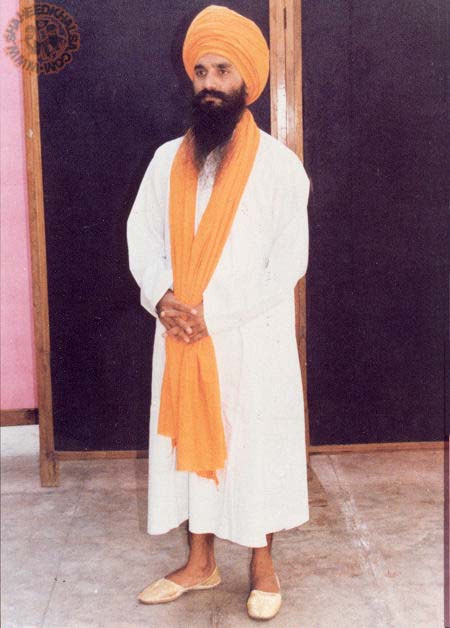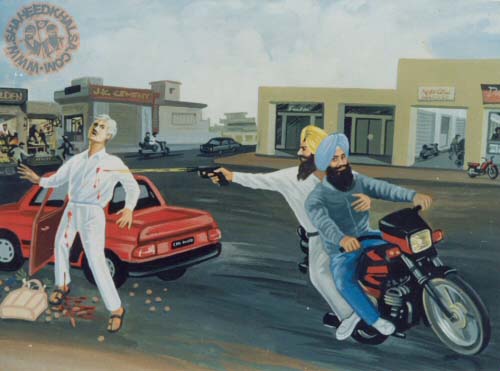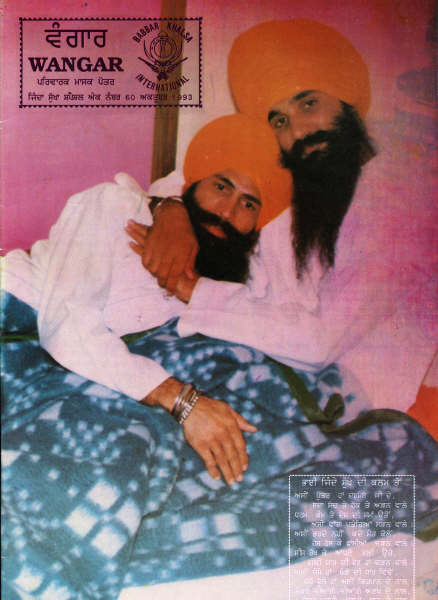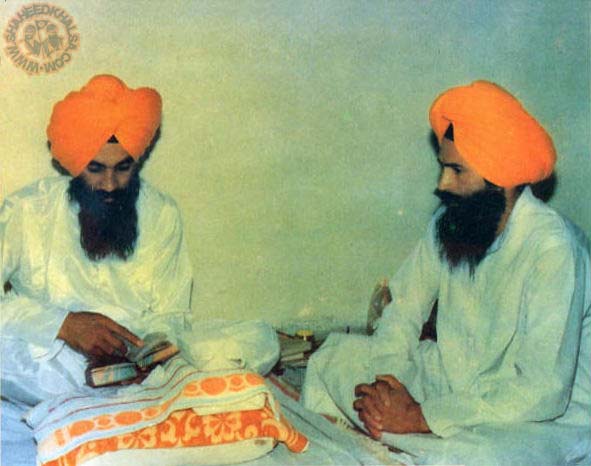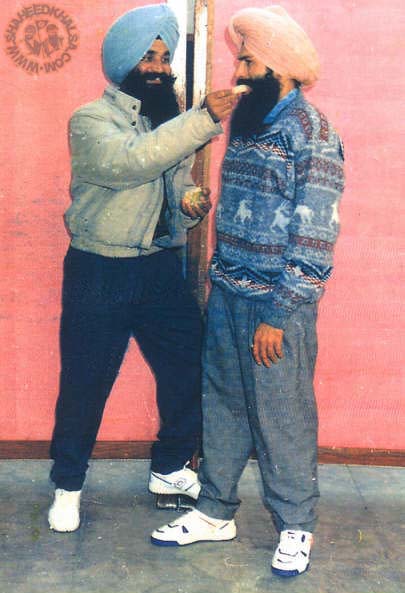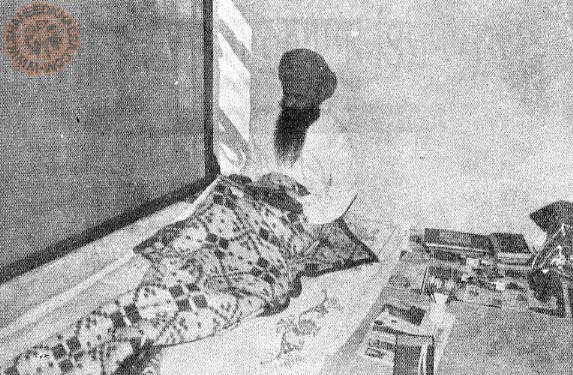

Library
|
Shaheed Bhai Harjinder Singh 'Jinda' Bhai Harjinder Singh was born in 1961, Bhai Gulzar Singh and Bibi Gurnam Kaur, and had two older brothers, Bhai Nirbhail Singh and Bhai Bhupinder Singh and one sister, Bibi Balvinder Kaur. He received his early education in his
village of Gadli in dist. Amritsar. After completing his early
education, he enrolled in Khalsa College Amritsar. He was in BA part II
when the 1984 attack occurred. Like every other Sikh, Bhai
Bhai Harjinder Singh then went to his maternal grandparents’ home in Baiee Chak, Ganganagar Rajasthan. Along with his cousin, Baljinder Singh Raju and his friend Bhai Sukhdev Singh Sukha, they decided to take revenge for the disrespect shown to the Gurdwaras. Bhai Bhai Harjinder Singh and Bhai Sukhdev Singh made Delhi the centre of their activities. Delhi was where the 1984 pogroms had taken place. The government began to broadcast the pictures of these Singhs on TV and the killers who had taken part in the November massacre were afraid to leave their houses.
Bhai Sukhdev Singh and Bhai Harjinder Singh then decided to punish the general who had planned the 1984 Darbar Sahib attack: General Arun. S. Vaidya After retiring from the army, Vaidya had moved to Poona. Bhai Harjinder Singh and Bhai Sukhdev Singh had reunited in Punjab and went to Poona together. They arrived on August 17, 1986. They went to the house that Vaidya was living at, to find he had moved. They asked the servant in the house where Vaidya had moved to but he wasn’t clear and they had trouble understanding his language. They went in the general direction and a couple days later saw Vaidya’s guard outside the house. They began to make regular rounds to find when Vaidya would come out.
On August 19, 1986 at around 11am, they saw Vaidya’s wife come out with an umbrella and the General followed. Vaidya himself was driving the car. He went to the Sabzil Mandi bazaar and bought sabji.. Bhai Harjinder Singh and Bhai Sukhdev Singh were on a motorcycle following them. When Vaidya was returning to his car, Bhai Harjinder Singh pulled the motorcycle beside the car and Bhai Sukhdev Singh began to shoot. Vaidya’s die on the spot.
The Singhs shouted jaikaaray and made their getaway. The Singhs had also wanted to kill Gen. Dayal, another officer responsible for the attack, but decided now was not the time. They returned to the house they had rented, changed clothes and took a bus to Bombay. From there, they went to Durg and then Calcutta by train. On September 17, 1986, Bhai Sukhdev Singh returned to Poona to get their weapons that were left there. He along with another Singh got into an accident with a truck and were arrested. They were tortured for five months and then for a year and a half were kept in leg irons. A year later, Bhai Harjinder Singh and Bhai Satnam Singh Bawa were arrested from Delhi at Gurdwara Majnoo Daa Tilla. Bhai Harjinder Singh was shot in the legs so he couldn’t walk. They tried to cut his leg off as well but a Bengali doctor refused to allow this. Bhai Harjinder Singh was tortured for 4 months and then taken to Poona. Bhai Bawa was given to the Punjab police who then killed him.
In Poona, Bhai Sukhdev Singh and the other Singhs had finished doing Ardas after Rehras Sahib, and then shouted Jaikaaray. Bhai Harjinder Singh was in a nearby cell and also shouted jaikaaray. Bhai Harjinder Singh had recognized Bhai Sukhdev Singh’s voice. Finally the two had been reunited. They stayed together from there on in, and will also be remembered in history together as Sukha and Jinda.
The Indian Government executed Bhai Harjinder Singh Jinda and Bhai Sukhdev Singh Sukha on October 9, 1992 in Pune. They were responsible for punishing Gen. Vaidya the architect of the 1984 attack on Sri Darbar Sahib. They had tracked him down and shot him dead and in the process, restored the honour and dignity of the Sikh people. Jinda Was No Ordinary Man The former Delhi Police Commissioner, Ved Marwah wrote his memoirs the following about Bhai Harjinder Singh Jinda and his commitment to Khalistan. Harcharan Singh (sic) alias Jinda who was convicted and later hanged for the murder of the former Army Chief, General A.S. Vaidya was no ordinary man. He was arrested twice by the Delhi Police during my tenure as Commissioner of Police, Delhi. This self-confessed killer was not just a ruthless killer. He had another side to his personality: he could be charming and humorous even when injured and battling for his life. When I met him after his arrest by the Delhi Police he seemed anything but a psychopath. He had psychological traits which made him and extraordinary person, but these did not make him mentally unsound. First Arrest Jinda was first arrested by the Delhi police in 1985, more by chance than owing to any previous knowledge that he was an active terrorist. A spate of bank robberies had taken place in Delhi and the Delhi Police was under criticism for its inability to stop them. I was daily being taken to task by the Union Home Minister and the media. Till Jinda’s arrest there was no evidence about any possible link between these bank robberies and terrorism in Punjab. Jinda fell into the police net on the basis of a low-grade information about the theft of a car. Only on the day after his arrest when during interrogation, Jinda started speaking about Pakistani plans for shootouts at public places and killings of Hindus to create Hindu-Sikh riots, that that the police realized that they had a big catch in their hands. The acting Additional Commissioner of Police Crime, RK Sharma rang me up in my house on a Sunday morning to inform me about his arrest.
Interrogation I decided to go to the Crime Branch Interrogation Centre to talk to this very ordinary looking man for over one hour and was fascinated by not only what he told me but the way he narrated his story. He had no fear and no remorse. He rather enjoyed talking about his many escapades in which the police, like in the Bombay films, did not come out very well. Here a young man from Amritsar had actually succeeded in getting the better of the entire Delhi Police force and that was something which gave him tremendous satisfaction. He underplayed his role as a terrorist in the cause of achieving Khalistan, perhaps intentionally but had no hesitation in boasting about his daring bank robberies in broad daylight in the heart of Delhi. He insisted on calling Delhi “Rajdhani” and obviously derived immense satisfaction from taking on the police in Delhi. Even at that stage though we did not know much about his terrorist antecedents, he talked in terms of “them” and “us”. It struck me even then that he was more forthcoming and almost friendly with me, because here he was talking to a head of the Delhi Police on an equal footing. He had no hesitation in telling me about his unhappy childhood and his petty crimes in Amritsar. He was later transferred to Gujarat from where he escaped while being escorted from the jail to the trail court. After his escape he started committing even more daring acts of terrorism. He became a feared terrorist and was well-known both in Delhi and Punjab. We learnt about his involvement in the killing of Lalit Makan the Congress MP and Arjun Dass, a close Sanjay Gandhi associate. Second Meeting He was arrested for the second time by the Delhi Police in August 1987, in an encounter in the Civil Lines area in which he was seriously injured. He was taken to the Civil Lines Police Station before the arrival of an ambulance. This time there was no doubt that the Delhi Police had scored a major success. His capture was the result of close cooperation between the Delhi Police and the Intelligence Bureau. I learnt about the encounter on my wireless set and rushed to the Police Station within a few minutes. Jinda was being moved into the ambulance on a stretcher when he saw me. He immediately recognized me and greeted me with a big smile. He must have been in terrible agony, but that did not stop him from joking. “Mubaraq ho. Ab to app ko bahut bari taraqui milegi. Delhi Police ne mujhe pakar liya hai” (Congratulations. Now you will get a promotion-Delhi Police has been able to arrest me). Here was a man almost on his deathbed and yet he had the audacity to poke fun and laugh. I could see that he was enjoying the thought of not only making the supreme sacrifice for the cause in which he believed, but of being able to be one up on the Commissioner of the Delhi Police. He was take to the Army Hospital in the cantonment, because of security considerations, and miraculously, he responded to the treatment after a successful operation. I went to see him along with DCP Crime, this time not to interrogate him but to see someone who had earned my respect. I must confess that then my feelings for this man were not that of professional police officer for an outlaw but were mixed with some warmth and admiration.
Ideology It is important at this point to say something about our system. Here was a known killer of the former Army Chief being treated by the army doctors, who performed nothing short of a miracle in saving his life. When I entered his room he was lying on the bed as the lower portion of his body was completely paralysed. The doctors could not say at that time whether he would ever be able to use his legs again. On seeing me he again greeted warmly and apologized for not being able to get up. He thanked me for coming to see him. He behaved as if he was talking to an old friend. He was in a talkative mood and this time told me all about the terrorist movement in Punjab and their ultimate goal of Khalistan with Pakistani help. He bragged about his escape from Ahmedabad and had absolutely no fear of death. He was certain that his end was not too far off and tauntingly told me that this time the Delhi Police would not make the mistake of handing him over to the Gujarat Police. When I told him that we would not hand him over to the Punjab Police as he suspected but to the Maharashtra Police to face a trial, he could not believe it. We later did hand him over to the Maharashtra Police. He was tried in the Pune Jail for a protracted trial and later hanged. Terrorism gave Jinda a cause to live for. There was no question of diverting him from the path which he had chosen for himself. He justified the most heinous of his crimes in the name of the “Panth”. It is the combination of political factors and such traits in their personality that attracts people like Jinda to the terrorist movement. The sole aim of his life became commission of terrorist acts, which he firmly believed would in the end succeed in achieving their goal of “Khalistan”. There is no scope for any negotiations with such men. But such personality traits are seen only among the hard-core terrorists. There are of course other types of person among terrorist their supporter and sympathisers who are more amenable to negotiations and compromise.
|

